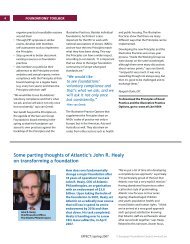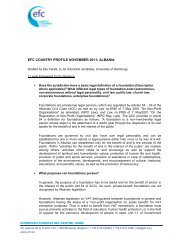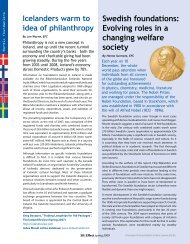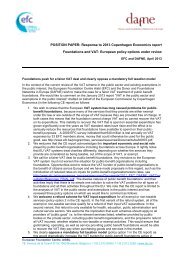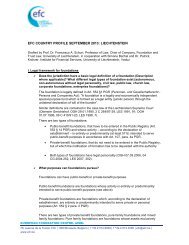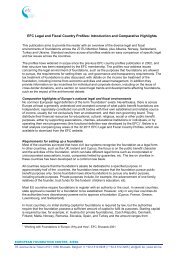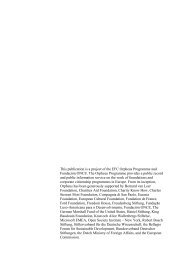European perspectives on global health: a policy glossary
European perspectives on global health: a policy glossary
European perspectives on global health: a policy glossary
Create successful ePaper yourself
Turn your PDF publications into a flip-book with our unique Google optimized e-Paper software.
3. Europe must assert its role<br />
in <strong>global</strong> <strong>health</strong> governance<br />
Governance describes how societies structure<br />
<strong>policy</strong> resp<strong>on</strong>ses to challenges they face and<br />
resp<strong>on</strong>sibilities they bear. Governance involves<br />
government, but the two terms are not<br />
syn<strong>on</strong>ymous because governance often occurs<br />
outside the formal state-based instituti<strong>on</strong>al<br />
and legal arrangements that characterise<br />
governments. Global governance for <strong>health</strong><br />
describes the structure and processes through<br />
which the <strong>global</strong> <strong>health</strong> issues are addressed.<br />
In the past, experts tended to analyse nati<strong>on</strong>al<br />
governance ( governance with a single state ) and<br />
internati<strong>on</strong>al governance ( governance between<br />
sovereign states ). Global governance represents a<br />
third level of governance characterised by new actors,<br />
new processes, and new norms designed to help<br />
societies individually and collectively manage the<br />
positive and negative aspects of <strong>global</strong>isati<strong>on</strong>.<br />
Global governance has emerged as a critical issue for<br />
public <strong>health</strong> and <strong>health</strong> <strong>policy</strong> because <strong>global</strong>isati<strong>on</strong><br />
has dramatically affected these <strong>policy</strong> endeavours and<br />
radically changed the challenges and resp<strong>on</strong>sibilities<br />
societies and their governments face in the <strong>health</strong><br />
field. Public <strong>health</strong> is no stranger to the need for<br />
states to cooperate with each other to address<br />
<strong>health</strong> problems. Internati<strong>on</strong>al governance of public<br />
<strong>health</strong> began to emerge in the mid-19th century<br />
and c<strong>on</strong>tinued with the World Health Organizati<strong>on</strong><br />
( WHO ) after World War II. Globalisati<strong>on</strong> has, however,<br />
rendered the territorial, State-centric approaches of<br />
nati<strong>on</strong>al and internati<strong>on</strong>al governance increasingly<br />
inadequate, because it weakens the ability of formal<br />
government and intergovernmental structures to<br />
retain c<strong>on</strong>trol over political, ec<strong>on</strong>omic, and social<br />
phenomena. Globalisati<strong>on</strong> has also empowered<br />
n<strong>on</strong>-State actors, especially through new informati<strong>on</strong><br />
technologies that allow them to participate more<br />
Global Health Policy Glossary<br />
effectively and efficiently in <strong>policy</strong> and governance<br />
endeavours.<br />
Globalisati<strong>on</strong> has, for example, de-territorialised the<br />
dynamics of many social determinants of <strong>health</strong>,<br />
which requires bringing new actors, new processes,<br />
and new norms to bear <strong>on</strong> the task of governing<br />
<strong>global</strong>ised <strong>health</strong>. Health ministries and internati<strong>on</strong>al<br />
<strong>health</strong> organisati<strong>on</strong>s have inadequate reach and<br />
authority to address <strong>global</strong>ised <strong>health</strong> determinants.<br />
Global governance’s emergence does not mean that<br />
the quality and effectiveness of nati<strong>on</strong>al governance<br />
and internati<strong>on</strong>al governance in the <strong>health</strong> c<strong>on</strong>text are<br />
unimportant. All three levels of governance are now<br />
necessary but not sufficient individually to manage<br />
the challenges and resp<strong>on</strong>sibilities of <strong>health</strong> <strong>policy</strong> in<br />
the 21st century. Indeed, it is critical that governments<br />
develop a coherent approach to <strong>global</strong> governance for<br />
<strong>health</strong> across <strong>policy</strong> sectors at the nati<strong>on</strong>al level.<br />
Global governance literature often stresses the<br />
importance of new actors in the governance of issues<br />
that transcend territorial borders. This phenomen<strong>on</strong> is<br />
true with respect to <strong>global</strong> <strong>health</strong> governance because<br />
experts have repeatedly emphasised the growth of the<br />
involvement of n<strong>on</strong>-state actors ( e.g., n<strong>on</strong>-governmental<br />
organisati<strong>on</strong>s, multinati<strong>on</strong>al corporati<strong>on</strong>s ) in creating<br />
and managing <strong>global</strong>ised <strong>health</strong> problems. The <strong>global</strong><br />
capabilities of these new actors produce new governance<br />
processes as states and internati<strong>on</strong>al organisati<strong>on</strong>s<br />
address or access these capabilities for governance<br />
purposes. A prominent new governance process in <strong>global</strong><br />
<strong>health</strong> is the public-private partnership, which attempts<br />
to harness governmental, intergovernmental, and n<strong>on</strong>governmental<br />
c<strong>on</strong>tributi<strong>on</strong>s to improve aspects of <strong>health</strong><br />
in the world. Global <strong>health</strong> has also seen the proliferati<strong>on</strong><br />
of <strong>policy</strong> networks and new financing mechanisms that<br />
include public and private participants.<br />
In additi<strong>on</strong> to new actors and new governance<br />
processes, <strong>global</strong> governance involves the creati<strong>on</strong><br />
and pursuit of new norms as the objectives of<br />
35



